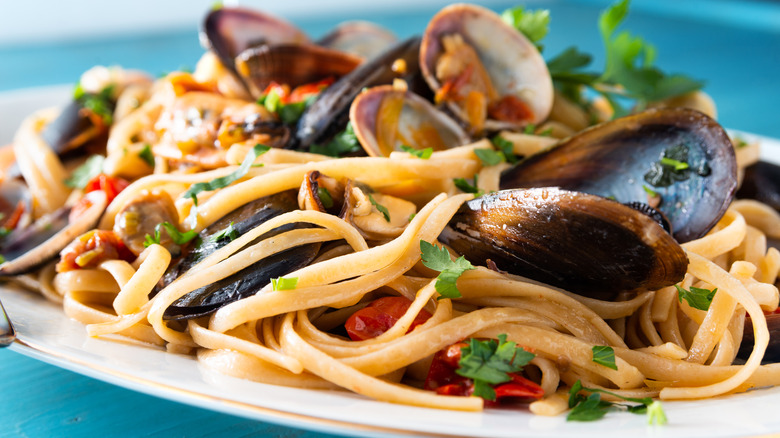How You Should Store Mussels And Clams (And How You Shouldn't)
When it comes to shelf-life, shellfish are a delicate food. They are made up of crustaceans and mollusks, including crabs, oysters, shrimp, clams, and mussels. They are a staple during summer months, though many restaurants offer them year-round, and people purchasing them fresh or catching their own should be aware of how to properly store and care for these sea creatures. If not frozen, there is a short window of time between when they are caught and when they start to go bad. Plus, eating bad shellfish can create plenty of digestive issues, meaning you likely won't want to take a chance if past its best-by date.
According to the Washington State Department of Health, fresh shellfish that remain in their shells can be stored in the refrigerator for up to seven days. The ones that have been removed from their shells should only be kept refrigerated up to three days. For mollusks, such as clams and mussels, the technique for properly storing them makes all the difference in how they taste.
How to properly store mussels and clams
Once you purchase your fresh seafood, you need to know how to properly store it if you don't plan to cook it right away. You should never store shellfish at room temperature. The Food and Drug Administration says that seafood should only be kept at room temperature for a maximum of two hours, or harmful bacteria could grow and cause illness.
When it comes to refrigeration, Simply Recipes says that mollusks like clams and mussels should be stored in a breathable container; this helps maintain their freshness and flavor. Keep them in a bowl, but cover them with a wet towel — a technique that also helps manage the humidity they are exposed to, per Washington State Department of Health.
Before you even put the mollusks in the refrigerator, you should weed out any that seem less than fresh. Clams and mussels should be alive when they're stored, and an easy way to test this is to tap their shells. If the shells immediately close, the shellfish is alive and safe to store. However, the Washington State Dept. of Health says that if she shells don't close, it's a sign that the shellfish is dead and should be thrown away.
Can you freeze mussels and clams?
If you purchase shellfish like mussels and clams only to realize you bought too many or had a change of plans, there is good news: they will do fine in your freezer. According to Fulton Fish Market, if you're freezing uncooked mussels, make sure to clean them first by bathing them in salt water, removing any loose fibers from the shell, and scrubbing them to get rid of debris and dirt. Then, place them in an airtight bag; they will last up to four months. You can also freeze cooked mussels. This might even be the better option because they will last up to six months.
There is one major difference between freezing mussels and clams: clams should not be frozen after being cooked, or it will damage their flavor and texture. Fulton Fish Market says that raw clams may be frozen either in or out of their shells, and both methods allow for four months of storage before the clams start to lose their flavor and texture.


